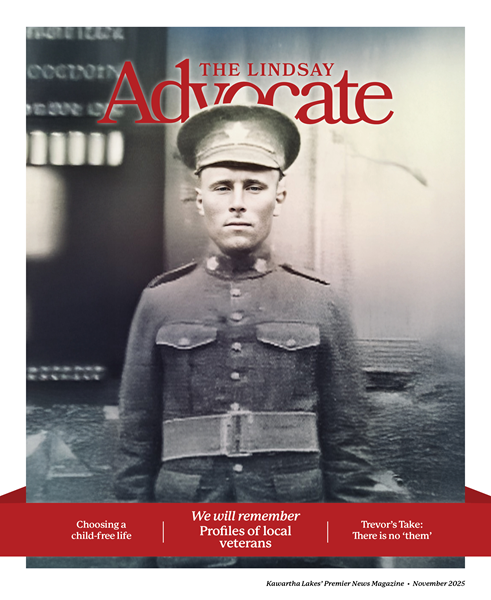New Emergency Response and Recovery Fund will help those in need

In the wake of the March ice storm, the Community Foundation of Kawartha Lakes (CFKL) has initiated a new fund that aims to provide financial assistance to organizations helping people facing adversity following an emergency, whether that is flooding, fire or power outage.
The freshly-minted Emergency Response and Recovery Fund grew out of discussions between CFKL, Kawartha Lakes Food Source and Community Care City of Kawartha Lakes as they touched base with each other to see what needs were most pressing in the community after the ice storm.
Laurie Dillon-Schalk, Executive Director of the CFKL says, “the fund addresses urgent needs like food, shelter and medical supplies while also supporting long-term recovery, all in collaboration with frontline organizations.”
The fund is not organized for individuals to access directly. Instead, it will assist organizations that provide help. Dillon-Schalk continued, “The Board is acutely aware of the pain that is out there, but we didn’t want to reinvent when organizations in the service sector already have the expertise. Part of the value in collaboration comes from the purchasing power of a group like Kawartha Lakes Food Source, which is three times what an individual can get at the grocery store. Working together we can really make sure we are making the biggest impact.”
Kawartha Lakes Community Futures Development Corporation and Glen Wright, a Four Mile Lake resident, stepped forward to become the founding sponsors. Wright’s involvement with the fund is part of his estate planning. He likes that a single, large donation can be distributed in chunks over time instead of all at once, and that “the Community Foundation is aware of where the needs are. They educate donors who may not have known about a specific situation.”
The CFKL – a public foundation – began in the aftermath of COVID-19 and they quickly established the Bobcaygeon and Area Covid Relief Fund, raising $180,000, and securing $190,000 in federal grants. Dillon-Schalk explains that the foundation “is a catalyst for local impact and lasting change. We connect generous donors – individuals, families, and businesses – with the causes that matter most to them. With a commitment to both donor intent and community need, we help build a vibrant, resilient Kawartha Lakes for all.”
Community Foundations are charitable organizations that focus on giving grants to programs in a specific community. They differ from non-profits in that they can offer a tax receipt for donations, and from charities since they can create funds and make grants. They also tend to have more flexibility than charities who must function under more strict operational guidelines. Says Dillon-Schalk, “Through strategic granting, we support a wide range of initiatives in social services, health, education, arts and culture, the environment, agriculture, infrastructure and community economic development.” That ability to support a spectrum of causes is the strength of a Community Foundation.
Unsurprisingly food security is a priority for fund administrators right now. Trina Connell of Kawartha Lakes Food Source points out that, “Even after the power is restored the impact of a storm like this can linger. We’re noticing increased anxiety around food security, and we want people to know they’re not alone. If you need help, please reach out – and if you are able to give, now is the time.”
Ryan Alexander, CEO of Community Care City of Kawartha Lakes (CCCKL) adds “we want to make sure our community is food secure in the wake of the ice storm. CCCKL offers over 40 services and through our Meals on Wheels program we want to ensure that even in times of crisis our neighbours experiencing challenges continue to receive the nourishment they need by having meals available in the freezer.”
What is surprising, however, is that despite hearing stories about people in need of assistance, none of the organizations received more calls than usual in the aftermath of the storm. This led them to believe that either they were still ahead of the wave, or that those affected didn’t know how to find the help they needed. Says Dillon-Schalk, “we suspect there are people trying to navigate for the very first time. They aren’t clients of Food Source, they aren’t clients of Community Care, but they need the support and are having trouble finding the resources they need.”
Fortunately, the fund is designed with a long view in mind, recognizing that while immediate needs like food insecurity must be addressed, recovery is often a long road. “Much like a savings account for the community, it’s a way to set aside resources today so we’re ready for whatever tomorrow brings – whether it is rebuilding infrastructure, offering mental health support, restoring livelihoods, or strengthening local resilience in the face of future challenges,” concluded Dillon-Schalk.
Donations can be made at kawarthafoundation.ca.





Great work! Very innovative and forward thinking. I don’t think people know how to access this sort of service. The storm was very hard on the vulnerable. I heard from some in isolated communities without power for ten days that paramedics were doing house to house checks. I think too that our community, where it can, does its best to help our neighbours.